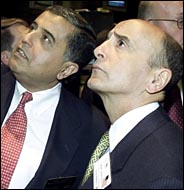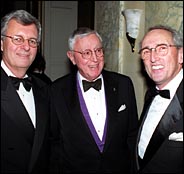Pfizer to Buy Large Drug Rival in $60 Billion Deal
By: ANDREW ROSS
SORKIN
NY Times, July 15, 2002

Fred Hassan, center, Pharmacia's
chief, and Richard A. Grasso, right, the chairman of the New York Stock
Exchange, on the exchange floor.
The drug giant Pfizer Inc. has agreed to acquire the
Pharmacia Corporation for $60 billion in stock, making it by far the most
dominant drug maker in the world, the companies announced this morning.
The transaction, which was approved on Sunday by the
boards of both companies would be one of the largest deals in what remains
a troubled and fragmented industry.
Drug companies, under intense pressure from
politicians, employers and managed care companies to limit price
increases, are having a hard time finding breakthrough products that would
assure the robust earnings growth investors demand. Pfizer's acquisition
of Pharmacia, resulting in a company that would still control only 11
percent of the global market, is likely to hasten the industry's continued
consolidation.

Henry A.
Kinnell, left, chief of Pfizer;
Robert
B. Shapiro, right, the former chairman of Monsanto;
and
Dr. Jeremiah A. Barondess, president of the New York Academy of Medicine,
at
an awards dinner
The merger would create a behemoth with $48 billion
in projected sales and many of the nation's most widely used drugs. The
combined company will have an annual research and development budget of
more than $7 billion - dwarfing that of its closest rival, GlaxoSmithKline,
by nearly half.
Pfizer - which already owns Zoloft, the
antidepressant; Lipitor, the nation's most widely prescribed
cholesterol-lowering drug; and Viagra - would also gain control of
Pharmacia's Celebrex and Bextra, two high-selling arthritis drugs, and
Detrol, a drug that treats bladder problems.
Pharmacia, formerly Pharmacia & Upjohn, is also
the maker of the Nicorette gum smokers use to help them quit, the Rogaine
baldness treatment and Luden's throat drops.
Executives said that by creating economies of scale,
the merger would help Pfizer to limit price increases. Pfizer is already
being conservative about raising its prices, they say, noting that it has
increased its price for Lipitor only modestly since acquiring it in the
2000 acquisition of Warner-Lambert.
Pfizer's headquarters would remain in Midtown
Manhattan. Pharmacia is based in Peapack, N.J. It is unclear how many of
the combined company's 150,000 employees would be let go.
Pharmacia recently completed the purchase of
AT&T's former headquarters in Basking Ridge, N.J. It is unclear what
would happen to its plans to relocate 2,500 employees there.
The Pharmacia acquisition would lengthen Pfizer's
lead as the largest drug maker in the United States and would vault it to
the top spot in Europe, Japan and Latin America.
Pfizer's proposed acquisition requires approval by
regulators in both the United States and Europe. Pfizer currently has
about 8 percent of the global market, while GlaxoSmith- Kline, the
second-largest drug company, controls 7.3 percent.
Analysts and investors have long speculated that many
pharmaceutical companies would be engulfed in a rash of mergers, leaving
only a handful of gigantic survivors. But so far, the largest expected
mergers have not materialized, analysts said, because the companies and
investors have questioned the long-term benefits.
Pfizer's deal could pressure rivals like
GlaxoSmithKline, which has been struggling to discover enough new drugs to
make up for those now losing their patent protection, to make acquisitions
simply to remain competitive.
GlaxoSmithKline's chief financial officer, John
Coombe, said last month that his company had been eyeing Bristol-Myers
Squibb, itself plagued by problems.
Pfizer's proposed acquisition of Pharmacia would help
sustain its growth, the executives contend, because 11 of its 12 combined
blockbuster drugs will be protected by patents through 2010. Its pipeline
of drugs in late stages of development would be expanded with several
promising Pharmacia drugs, including eplerenone, a new category of
treatment for cardiovascular diseases; parecaxib, an injectable athritis
treatment; and CDP-870, another drug that treats rheumatoid arthritis.
With an enlarged research and development budget,
Pfizer hopes to discover and develop more new drugs faster than its
competitors. The combination would have nearly 120 new chemical entities
in development and 80 so-called drug enhancement projects.
The deal would also introduce Pfizer to two markets
it has never been in before: cancer treatment and ophthalmology.
Analysts have questioned the value of the drugs
Pharmacia has in development. ``Although the company's pipeline contains a
number of interesting new products,'' Peter Norman, a pharmaceutical
consultant and analyst, wrote in a recent report, ``none have clear
blockbuster potential.''
A swirl of controversy surrounds one and possibly two
of Pharmacia's top selling arthritis drugs, Celebrex and Bextra. Last
month, Express Scripts, one of the largest pharmacy benefit-management
companies, said that Celebrex and a rival Merck drug, Vioxx, were being
overly prescribed and have only a narrow benefit over older drugs like
ibuprofen and naproxen, which are available in generic and
over-the-counter versions for a fraction of the price.
Express Scripts said it was recommending that its
clients, which include many employer health plans, require patients who
are not at risk of ulcers to try generic pain relievers first, possibly
denting sales of Celebrex and Bextra, which is similar.
Washington lawmakers have been vocal in recent months
about rising drug prices and their cost to uninsured senior citizens and
states that have to pay escalating Medicaid bills.
But the deal will probably be approved by regulators
because the companies have few overlapping drugs. The only possible
overlap may be between Pharmacia's Detrol and a competing drug that Pfizer
is currently developing. Executives close to the transaction expect the
deal to be completed by the end of the current year.
The executives said they expected the deal to create
as much as $2.5 billion in annual savings by 2005. They expect savings of
$1.4 billion in 2003 and $2.2 billion in 2004. The savings will come from
cuts in administrative costs, purchasing, manufacturing, distribution and
research and development.
Pfizer's absorption of Warner-Lambert was widely
admired as a model of how to fully exploit an acquired portfolio of
blockbuster drugs.
Pfizer's chairman and chief executive, Henry A.
McKinnell, who conceived of the deal, would run the combined company. Fred
Hassan, Pharmacia's chairman and chief executive, would become vice
chairman of Pfizer and get a seat on the board.
Under the deal, Pfizer would trade 1.4 of its shares
for each share of Pharmacia, according to the executives. That price of
$45.08 a share, based on Friday's close, represents a 38 percent premium
over Pharmacia's stock price of $32.59. Pfizer shareholders would own 77
percent of the combined company, the executive said, while Pharmacia's
shareholders would own 23 percent.
Before the completion of the deal, Pharmacia plans to
proceed with its previously announced spinoff to its shareholders of its
remaining stake in Monsanto, the executives said. As a result of the
spinoff, Pharmacia's shareholders would actually receive the equivalent of
about a 44 percent premium, they said.
Pfizer also announced today that it would expand its
$10 billion stock repurchase to $16 billion, a measure that may help
stabilize the value of its stock. After most merger announcements, the
acquirer's stock at least temporarily declines.
Pfizer was advised by Lazard and Bear, Stearns &
Company and represented by the Cadwalader, Wickersham & Taft law firm.
FAIR USE NOTICE: This
page contains copyrighted material the use of which has not been
specifically authorized by the copyright owner. Global Action on Aging
distributes this material without profit to those who have expressed a
prior interest in receiving the included information for research and
educational purposes. We believe this constitutes a fair use of any such
copyrighted material as provided for in 17 U.S.C § 107. If you wish to
use copyrighted material from this site for purposes of your own that go
beyond fair use, you must obtain permission from the copyright owner.
|



